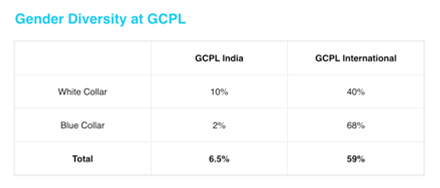This week, I want to share some thoughts on becoming an inclusive leader. I am delighted that Farah Nathani-Menzies has co-written this piece. Farah, as many of you know, spearheads Diversity & Inclusion for Godrej Industries.
Have you ever felt like an outsider? More like a spectator than part of the core team? I’m sure many of us at some point have had the experience of being ‘on the outside’. Now, imagine if we could encourage all of our team members who feel left out, to contribute and have their voices heard. That is the true meaning of being inclusive – to foster an environment where everyone, regardless of race, age, gender, sexual orientation or religion, feels truly valued. In fact, research has consistently shown that team members who feel included are more productive, perform better and are more loyal.
As you already know, being more diverse and more inclusive is a critical imperative for us. Today, nearly half of our revenues at GCPL come from our international businesses and two-thirds of our team members are based outside India. As our reach expands, the composition of our teams will change and with it, the need for us to become more inclusive as a company,
While they go hand-in-hand, there is a difference between diversity and inclusion. We can work towards building a diverse workforce, but unless we are able to honestly champion and truly value differences, we will never be able to create an inclusive workplace.
So, what does being an inclusive leader mean? Attached with this email is a short quiz from a recent global report on inclusive leadership. Do take the quiz when you get a chance – it will get you thinking about how inclusive a leader you are.
How can we foster an inclusive work environment? And what are some effective ways to make every member of a team feel valued? There has been a lot of recent research on what leaders can do differently to become more inclusive. Some of the suggestions include:
1. Walk the talk
Inclusion is not a ‘nice to have’, but a business necessity. Research has shown that a diverse workforce translates into teams who are more representative of a cosmopolitan consumer base – they ‘match the market’ – and are therefore, of great value to an organisation. Being inclusive ties in very well with the Godrej ethos and can be a competitive advantage for us. And it needs to start at the top. Our team members look to us as role models and so it is very important that we foster an environment where all our team members feel included and valued. And sometimes, it is the small things that make a difference. For example, a few months ago, one of our senior leaders sent an email to his team and copied another female colleague who had recently met her targets. The email was meant to be complimentary, congratulating the female colleague on achieving her goals. However, the leader had written that the colleague deserved to be recognised for achieving her numbers, “in spite of being a girl”. How do you think the female colleague would have felt?
2. Don’t gloss over differences
Let’s face it. People are different. So, there is no point saying that “I am blind to differences and I treat everyone the same”. Be open to perspectives different from your own. Encourage everyone’s opinion. For people to belong, it doesn’t mean that they have to all be the same or blend into a mold. As leaders, we need to back this vocally, value differences and make our team members feel comfortable enough to openly share their perspectives.
One simple way to make team members feel more included is to seek their input and perspectives in team meetings. When a particular issue is being discussed, ask team members what they think, draw out their opinions and listen to them. This will not only signal that you value people’s ideas but you will also get the added benefit of diverse points of view. Also, make sure that you or a select few are not monopolising the discussion – create an atmosphere where all team members feel comfortable voicing their opinions.
3. Be available
Understand what makes each of your team members unique, and then help them build towards their aspirations. Foster an open-door culture. Help them work around the constraints that they may have. We have policies and support groups to make work schedules flexible and help people balance commitments on the work and home fronts.
4. “LBO” – Look Beyond the Obvious
Recognise and develop team members who may not fit the ‘traditional’ mold. It is fine to give them the extra attention they need to thrive. You will not be ‘unfair’ if you do so. Just think from their perspective – without a certain level of hand-holding, it may be so hard for them to feel included. We need to actively foster this spirit of sponsorship at Godrej, if we are to make real progress on our inclusion journey.
5. Give everyone a seat at the table
Sheryl Sandberg, COO, Facebook, shared this wonderful tip. At a meeting with a very senior government official, she asked her two senior female colleagues to join them at the discussion at the table. The women chose instead to sit in a corner of the room. Have you seen this happen at Godrej? Where women are hesitant to come forward and physically take a front seat at what might be otherwise a male dominated space? And this doesn’t just happen with women. It is a concern with everyone who feels like they are in a minority. Quite simply, where you sit translates into who you are. And change can’t happen unless everyone sits at the table. So, encourage all your team members to find a seat.
6. Policies are only a start
At Godrej we are strongly committed to being inclusive. We have policies in place to ensure equity in pay and opportunities for all our team members, regardless of gender, race, religion or sexual orientation. As leaders, we need to ensure that these don’t just remain at a policy level. We need to actively make the policies come to life through the way we reward, recognise and develop our team members.
7. Make it a goal
Actions speak louder than words. Let’s not leave this at plans. If we want to build diverse teams, then it needs to become a goal, just like any of the other business priorities that we track. Remember, that becoming more inclusive will be a journey. It is not a once-in-the-year check-the-box initiative. You have to be proactive and keep on working on this.
A few months ago, our Management Committee discussed gender diversity and studied recent data across GCPL. As you will see, our India representation numbers are on the lower side. We are incorporating Diversity & Inclusion goals into our LRP agenda and hope to be able to change our profile over the next 3-5 years.

Our colleagues at Godrej Properties have made tremendous strides in improving gender equality. Three years ago, women made up 16% of the workforce and today, women are about 26% of the GPL business. This has been achieved through a strong focus on improving women representation. The team did not lower the bar on hiring, but instead made sure that there were enough women candidates in the recruiting pipeline.
Other FMCG companies have also been taking many strides to improve their diversity profiles. HUL for example, has a successful part-time, back-to-work programme for women returning to work after a career break. P&G has an ‘Everything equal but safety’ policy for women employees, which means that men and women are treated equally in all respects (e.g. compensation, promotions, etc.) but when it comes to safety for women, the organisation understands that this is an area where they can never take a risk. Cadbury has recognised that diversity at senior levels will come only when there is an extra push – some form of affirmative action – and have therefore rolled out a targeted mentoring and coaching programme for all women managers.
Do remember that the responsibility for making Godrej a more diverse and inclusive culture lies with each one of us.
I leave you with a thought provoking speech made by Emma Watson at the UN General Assembly. Please do watch this when you have the time:
I quote from her speech – “I am inviting you to step forward, to be seen to speak up, to be the “he” for “she”. And to ask yourself if not me, who? If not now, when?”
As always, please do share your thoughts and experiences with our team. I am confident that together, we can build a truly inclusive Godrej.
Best,
Vivek
P.S. I would welcome the opportunity to co-write future editions of #monday8am with any of you who are interested. So, please let me know.









sir,
I totally agree with these thoughts. I came from a family of illiterate parents and 4 female siblings, and I understood the need to educate girls include them in the workforce and make them independent.
One of my elder sister used to weave beedies to pay for my school fees .
so I understood the importance of of female education employment in the early age.
So in the capacity of an ASM I had two female sales officers in my team in Pune 9 years back.(at that time they were the only two female sales officers in frontline sales in Godrej Saralee).One of them is still working in Mumbai team. One of sales officer Ganesh Naidu had a full team of 6 sales girls in his team. I think that they have a better EQ and get equal or better work from the team.
That was my small contribution towards inclusiveness. I still believe in this philosophy.
Thanks so much, Shetty, for sharing a wonderful example of imbibing the lessons from your life and practising them. Too often, people have gender biases in terms of certain professions. It is great that you are dispelling these myths. Keep it up.
Sir,
I am really touched by these thoughts. It’s high time we as a society and even the corporate world accept the fact that women are no less than men, but in fact ahead of men in many areas.
Regards,
Mehul Dongre
mehuldongre@yahoo.com
We would look at Godrej from the prism of a gendered organisation, my business has its majority leadership as women. Interning with Nature’s Basket, I realized through my personal journals that Godrej as an organisation has thrown the glass ceiling itself out of the window let alone breaking it, many have not analysed situation post the breaking of the glass ceiling. I think the younger lot at Godrej could be a case study in terms of organisation citizenship behaviours, where there is less to prove and more to achieve.
Happy to read your blogs, Sir!
Hope to interact with you at Godrej One.
Thank you.